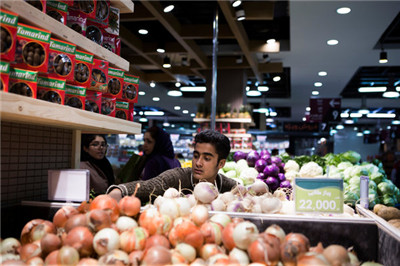(单词翻译:单击)
TEHRAN, Iran — The low rumble of powerful engines reverberated against the high-rises of Zaferanieh, an upmarket neighborhood, as Porsches and Mercedes lined up to enter the multistory parking lot of a fancy new shopping mall, the Palladium, the latest addition to Tehran’s shopping scene.
伊朗德黑兰——在高档社区“藏红花”(Zaferanieh)的高楼之间,回荡着低沉而有力的引擎轰隆声。保时捷和奔驰车鱼贯进入奢华的新购物中心“帕拉狄翁”(Palladium)的多层停车场。这是德黑兰最新的购物胜地。
Iran may be facing a dangerous economic abyss, with an empty treasury, historically low oil prices and the continuing damage of Western economic sanctions, but one indicator is going through the roof: Developers have broken ground on a record 400 shopping malls across the country, 65 in Tehran alone.
伊朗可以说正在面临危险的经济噩梦,国库空虚、油价创下历史新低,还有西方经济制裁带来的持续损害。不过,有一个经济指标却一飞冲天:开发商在伊朗全国破土动工了创纪录的400座购物中心,单在德黑兰就有65座。

In part, the malls are a lagging indicator, a testament to a not-so-distant past when Iran was raking in record oil profits, earning more than $700 billion in the last decade. Awash in money, with a relatively strong currency, Iranians developed a taste for luxury, setting off a boom in construction projects to host new shopping experiences.
某种程度上,这些商场是一个延迟的指标,见证的是不久之前伊朗从石油上赚得盆满钵满的时代:过去十年的石油总收入超过了7000亿美元(约合4.35万亿元人民币)。现金流充裕加上货币相对强势,伊朗人培养出了对奢华事物的喜好,激发了那些旨在带来购物新体验的建设项目的开发热潮。
But the mall-building boom also reflects other factors, as construction and investment companies affiliated with the Revolutionary Guards Corps and the police have led the way.
不过,购物中心热还反映了其他一些因素,与伊斯兰革命卫队(Revolutionary Guards Corps)及警方有关系的建筑与投资公司在这股热潮中一马当先。
“Under sanctions, with nowhere else to invest, building shopping malls is the only lucrative business in Iran,” said Jamshid Edalatian, an economist. “The Guards, the police and other institutions are the ones who have money, so it is logical for them to invest in what makes a profit.”
“在制裁之下,没有别的地方可以投资,建购物中心是伊朗眼下唯一利润丰厚的生意,”经济学家贾姆希德·伊达拉季安(Jamshid Edalatian)说。“只有卫队和警察这样的机构才坐拥资金,所以他们投资到可以赚钱的领域是合理的选择。”
Together with banks, wealthy individuals and powerful foundations, tax-exempt organizations that are supposed to care for the poor, Iran’s security forces are building malls with Western-sounding names such as Rose, Mega Mall and Atlas Plaza. Their bright neon letters stand in sharp contrast to the revolutionary slogans painted on murals in surrounding neighborhoods, labeling consumerism a Western illness and taboo under Iran’s rigid ideology.
与银行、富裕的个人、有势力的基金及本该为穷人提供帮助的免税机构一起,伊朗的安全部门正在修建诸多如“玫瑰”(Rose)、“美嘉商场”(Mega Mall)和“阿特拉斯广场”(Atlas Plaza)这样名称带着西式风情的购物中心。它们外面挂着鲜亮的霓虹字母,与附近社区墙上刷着的革命口号形成了鲜明对照。在那些口号中,遵照伊朗严苛的意识形态,消费主义是西式病态的象征,应予禁绝。
Not so long ago, shopping in revolutionary Iran was a dull experience, with hole-in-the-wall stores offering the same clothes, electronics and furniture. Shopping was considered a necessary evil meant to support a life of religious piety. Commercials, once banned on state television and billboards, are now allowed, but only for Iranian products.
就在不久之前,在伊朗购物还是件无趣的事情,只有局促的小商店卖着千篇一律的服装、电子产品和家具。购物被认为是支持宗教虔诚生活的一种必要之恶。官方电视台和露天大标牌上曾经不准放广告,如今虽然允许了,却只准宣传伊朗产品。
The new malls represent a departure from all this. Customers can stroll past Nike and Massimo Dutti stores, order freshly baked baguettes in the ground level supermarket or work out at the penthouse gym overlooking the city and its majestic Alborz mountain range.
然而,新的购物中心与这一切背道而驰。客人们可以悠闲地逛耐克(Nike)和Massimo Dutti店铺、在底层的超市购买新鲜出炉的法棍,或者在顶层的健身房鸟瞰全城,观赏雄伟的厄尔布尔士山脉。
“We cater to what people desire to do: spending money, buying stuff and enjoying themselves as they shop” said the owner of the Palladium, Hassan Raftari, who described himself as a shopaholic. The scion of a family famous for its kebab restaurants, Mr. Raftari led a business expansion into the construction of luxury apartment buildings. During his trips abroad, he said, he would always wonder why shopping in Iran was so boring.
“我们满足了人们的欲望:花钱、买东西、享受购物,”帕拉狄翁的老板哈桑·拉夫塔里(Hassan Raftari)说。他号称自己是购物狂。拉夫塔里的家族以经营土耳其烤肉餐厅出名,而他本人领导的企业扩展到了建造奢华公寓楼的领域。他说,自己去海外旅行的时候,总是会想,为什么伊朗的购物体验如此无聊?
“So I decided to build my own shopping center,” he said, stressing that his mall is 100 percent private owned. He is now selling the mall’s 250 shops one by one, reportedly at prices of around $330 a square meter. “We have 1,000 parking spaces and my only mistake has been that I haven’t built more,” said Mr. Raftari.
“所以我决定建造自己的购物中心,”他说,并且强调名下的这座商场为百分之百私人拥有。眼下,他在逐个出售其中的250家铺面。据报道,价格约为每平米330美元。“我们拥有1000个停车位。我唯一的失误是没有建更多,”拉夫塔里说。
Malls comparable to the Palladium are mushrooming across the city. According to an industry website, Iranmall.ir, 65 malls and entertainment center are currently being developed in the capital, and not just for the rich. Around Tehran’s southern bus terminal, one of the poorer areas of the city, three malls are under construction.
在德黑兰,与帕拉狄翁类似的购物中心正如雨后春笋般冒出来。根据行业网站Iranmall.ir的统计,这里目前有65座购物和娱乐中心项目在开发,而且目标客户群并不只是富人。德黑兰南部的公交总站位于城里较为贫困的地区,却也有三座购物中心正在兴建。
For urban Iranians, many of whom have seen their income dwindle during years of sanctions, the malls are a confirmation of their growing influence.
对许多伊朗城市居民而言,他们眼看着自己的收入在多年的经济制裁中逐渐缩水,而这些购物中心却是对他们日渐扩大的影响力的一种肯定。
Since the 1979 Islamic Revolution, the state has dominated public spaces, using murals, the morals police and state media to emphasize what officials say are unchangeable revolutionary values. In private, though, Iranians have moved on, embracing satellite TV and the Internet, widening their world views and comparing their lives to those of people in Turkey, Malaysia, Europe and other popular holiday destinations.
1979年的伊斯兰革命以来,国家占据了绝大部分的公共空间,利用墙上的口号、道德警察和官方媒体来强调官方宣扬的不可撼动的革命理念。然而,在私底下,伊朗民众已经在向前看了,他们热情接纳了卫星电视和互联网,扩展了世界观,并将自己的生活与土耳其、马来西亚、欧洲及其他度假胜地的民众的生活进行了比较。
From that perspective, the ornate shopping malls stand out as middle-class outposts in the state-controlled economy, indications of Iranian’s increasing desire to join the modern world, experts say.
专家表示,从这个角度来看,那些华丽的购物中心在国家控制的经济里成了代表中产阶级的堡垒,象征着伊朗人日渐加深的融入当代世界的渴望。
“Nowadays, there are just so many urbanized, middle-class people in Tehran who aspire to Western lifestyles,” said Kazem Alireza, a history researcher working for the Parliament. “Their needs are met by developers who offer them consumerism, just like the Western patterns of urbanization and changing lifestyles. Shopping malls make people happy, at least for now they are satisfied with them.”
“现在,德黑兰有了好些向往西式生活方式的城市化中产阶级,”为国会工作的历史研究者卡齐姆·阿里礼萨(Kazem Alireza)说。“提供消费主义的开发商满足了他们的需求,就像西式城市化和不断变化的生活方式一样。购物中心让人们觉得开心,至少现在能让他们感到满意。”
The boom in shopping malls is just simple economics, insiders say. “Basically a group of 10 to 20 very wealthy individuals and state institutions are building all the malls,” said one chief executive of a design company that serves the shopping centers, who asked not to be named because of a fear of losing business. “They have moved from housing projects to malls. It’s just very profitable.”
有业内人士称,购物中心热不过是出于简单的经济盘算。“基本上是一二十家非常富裕的个人和官方机构在修建所有这些商场,”一家设计公司的首席执行官说。此人所在的公司在为购物中心服务,出于丢掉生意的担忧而要求不具名。“他们从住房项目转到了购物中心项目上。因为实在是能赚很多钱。”


